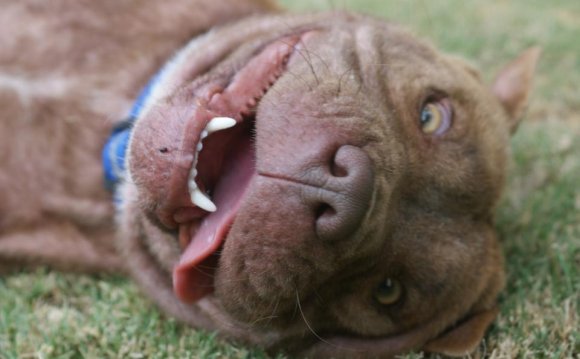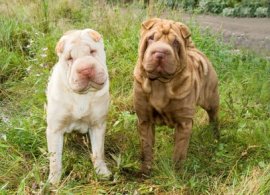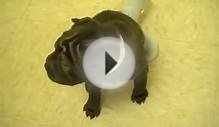
 The Shar Pei breed originates from China where he did work as a hunter and guard dog – also as a fighting dog. For this reason, some Shar Peis may be prone to aggression. In his native country his features (chiefly his wrinkly skin) were much less exaggerated than many Shar Pei you see today. He is a large, lumbering dog who needs to live in a house with a garden. He has short, bristly hair which needs grooming regularly. He needs some exercise every day. In the interests of dog health and welfare, you are advised to avoid the extreme type of Shar Pei in favour of a leaner, more muscular dog with far fewer wrinkles.
The Shar Pei breed originates from China where he did work as a hunter and guard dog – also as a fighting dog. For this reason, some Shar Peis may be prone to aggression. In his native country his features (chiefly his wrinkly skin) were much less exaggerated than many Shar Pei you see today. He is a large, lumbering dog who needs to live in a house with a garden. He has short, bristly hair which needs grooming regularly. He needs some exercise every day. In the interests of dog health and welfare, you are advised to avoid the extreme type of Shar Pei in favour of a leaner, more muscular dog with far fewer wrinkles.
(should be as low as possible)
The breed average COI is 3.4%
(body shape and physical characteristics)
- Skinfold dermatitis (Intertrigo) is common due to intentional breeding for excessive skin folding – causes recurring bouts of skin irritation and soreness.
- His relatively small eyes surrounded by loose, wrinkly skin makes the Shar Pei prone to Entropion (inward rolling of the eyelids, causing irritation, pain, discomfort) Other eye problems also occur due to this dog’s facial conformation.
- Brachycephalic upper airway syndrome, caused by skull shape, results in breathing difficulties.
- The Shar Pei’s wrinkles have been found to be linked to Shar Pei fever (autoimmune inflammatory condition – widespread – recurring fever accompanied by aching and swollen joints – one in five dogs go on to develop Amyloidosis – affecting kidneys and liver – chronic inflammation – sometimes fatal)
- Otitis (ear infections) partly due to selection for tiny ears/ear canals which hinder air-flow
BVA/KC Health Schemes
- Hip dysplasia (abnormality of the hip joints causing pain and disability): breed mean score 17 (parents should be lower)
- Elbow dysplasia (abnormality of the elbow joint causing pain and disability: score ideally O:O)
- The Shar Pei is one of the 15 high profile breeds designated by the Kennel Club as requiring particular monitoring by reason of visible conditions which may cause health and welfare concerns
DNA tests available
None available
Unofficial (breed club) schemes
None known
Ask the breeder to show you the certificates for the above tests/screening for both parents (or check the KC’s health test results finder). If any of the above tests have not been considered necessary by the breeder (and there may be good reasons), ask her to explain why.
(for which there are currently no genetic or screening tests for sire or dam)
- Atopy (hypersensitivity to pollen and other protein particles – causes intense itching and can lead to skin trauma)
- Generalised demodicosis (Demodectic mange) – skin disease caused by the demodectic mite
- Shar Pei fever (autoimmune inflammatory condition with recurring fever accompanied by aching and swollen joints. Many affected dogs go on to develop Amyloidosis – affecting the kidneys and liver. Sometimes fatal)
- Arthritis – immune mediated
- Recurrent otitis (ear infections) (
- Primary seborrhoea (an excessively oily skin and inflammation). The condition can be aggravated by the excessive skin folding.
- Panosteitis (bone inflammation)
- Entropion (inward turning eyelids which can cause irritation, pain and damage to the eyes) Very common in this breed.
- Haemophilia A (blood clotting disorder)
- Patellar luxation (dislocated kneecap)
- Cancer: canine cutaneous histiocytoma; mast cell tumour
- Eye disease: Glaucoma, Lens luxation, Cherry Eye.
- Megaoesophagus (enlargement of the eating tube)
Ask the breeder about the medical history of the parents, grandparents and great grandparents. Consider carefully whether to purchase a puppy if some of these or other diseases are in the family line.
Ask about the breeder’s policy in cases of serious genetic diseases occurring to your puppy in later life. Good breeders will request to be informed of such events in order to improve future breeding decisions. Some breeders will also agree to contribute towards medical costs or refund purchase price.
You are also advised to buy from a breeder who follows the Dog Advisory Council’s Standard for Breeders
Or the Kennel Club’s Assured Breeders Scheme Standard and Guidance:
YOU MIGHT ALSO LIKE












